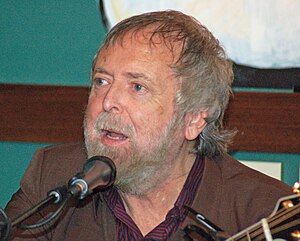Augusta’s thirty-year tradition of excellence
 Mick Moloney at the Shanachie, in Ambler, Pennsylvania. (Photo credit: Wikipedia)“With traditional music it takes a generation,” Billy McComiskey recently told me. “You don’t realize what you’ve done until you look back on it.” While it’s been well more than a generation for the Augusta Irish/Celtic Week, the first program to celebrate traditional Irish music and heritage in the United States, and now marking its 30th anniversary, when we look back at its history we find one of this country’s – and this music’s – most enduring and important cultural and educational institutions.
Mick Moloney at the Shanachie, in Ambler, Pennsylvania. (Photo credit: Wikipedia)“With traditional music it takes a generation,” Billy McComiskey recently told me. “You don’t realize what you’ve done until you look back on it.” While it’s been well more than a generation for the Augusta Irish/Celtic Week, the first program to celebrate traditional Irish music and heritage in the United States, and now marking its 30th anniversary, when we look back at its history we find one of this country’s – and this music’s – most enduring and important cultural and educational institutions.It all started out fairly innocuously. In the late 1970s, the Irish repertoire was fast becoming part of the burgeoning American new-folk scene and Mick Moloney was one of a very small number of Irish musicians performing off traditional music’s beaten track, places largely dominated by old time and bluegrass music.
He made quite an impression with these audiences, particularly at the weekend festivals that were part of the Augusta Heritage Arts Workshops that had been held on the campus of Davis & Elkins College in Elkins, West Virginia since 1972.
There was a buzz about Moloney’s performances, so when the Augusta program was overhauled and renamed “Augusta Heritage Center” in 1981, the program’s director, Margo Blevin, contacted Moloney about organizing a one-off Irish music teaching week – something in the spirit of the infamous Willie Clancy Week in Miltown Malbay, County Clare. Moloney thought it was a great idea, so the following summer he came down with Billy McComiskey and Liz Carroll to an eager group of 45 students.
McComiskey remembers his class being a potpourri of instruments, everything from autoharps to flutes. Carroll took the fiddles while Moloney taught those with stringed instruments not played with a bow.
“The important thing about those first couple of years was that Mick was astute,” McComiskey told me.
“Right from the very beginning he presented the music as a bunch of different instruments cooperating – students and teachers alike.” This group established a spirit of camaraderie between instructor and learner, an important dynamic that over the years has become the hallmark of the Augusta week.
The success of the first year guaranteed a second, with Tim Britton (uilleann pipes) and Donny Golden (dance) invited to teach. Then year after year, as the student body grew, so did the number of instructors and course offerings – classes in dancing, storytelling and crafts as well as lectures on Irish history and culture complemented an already rich environment of singing and music.
“We watched the Irish-American scene grow before our eyes,” Moloney told me, nostalgically. “It became kind of like a graduate seminar for Irish and Irish American culture.”
While the week’s numbers have consistently increased, the intimacy remains. “It was our family,” Moloney told me. “We got to know each other there.” This, in part, due to the small, walkable campus, but also because of an environment lined with top players. “We had the very best, always,” Moloney mused.
“You came and met the best from this side of the Atlantic, but also the homeland.” This has included people like James Kelly, Kevin Burke, Johnny Cunningham, Seamus Connolly, Jerry O’Sullivan, the Mulcahy Family, John Skelton, Jack Coen, Robbie O’Connell, Jerry Holland, Zan McCleod, Albert Alfonso, Seamus Egan, Eileen Ivers and Joanie Madden (who was the artistic director for the last five years).
One of Augusta’s most enduring and best-loved characters was the truly legendary singer Frank Harte, who was a fixture there for 15 years.
“Frank held court, but also understood the need that students had to be heard and to be appreciated, because he had the same need,” the Augusta Heritage Center’s current director Joyce Rossbach told me.
Out of this environment came some of today’s best and brightest players. For example, uilleann piper master Benedict Kohler (who many feel makes the world’s finest chanters and reeds) was there. Beverly Buchanan of the group Liam’s Fancy started out there as well. In fact, a modern generation of top younger players – people like Cleek Schrey, Jim Egan, Sean McComiskey, Elliot Grasso, Matt Mulqueen, Brendan Callahan, Caitlin Finley and Patrick Armstrong – all passed through Elkins.
Augusta’s tradition of excellence and intimate dedicated study continues this year with a staff that includes Patrick Ourceau, Mick Conneely, Cillian Vallely, Ivan Goff, Brían Ó hAirt, Niall O’Leary, Donna Long, Marla Fibish, Dennis Cahill, and many more. Imitated but never duplicated, it is a special place that after 30 years has proven its mettle in the history of Irish America, and done so in a very fundamental way.
To learn more, visit: http://augustaheritagecenter.org/irishceltic.
Augusta’s thirty-year tradition of excellence





Comments